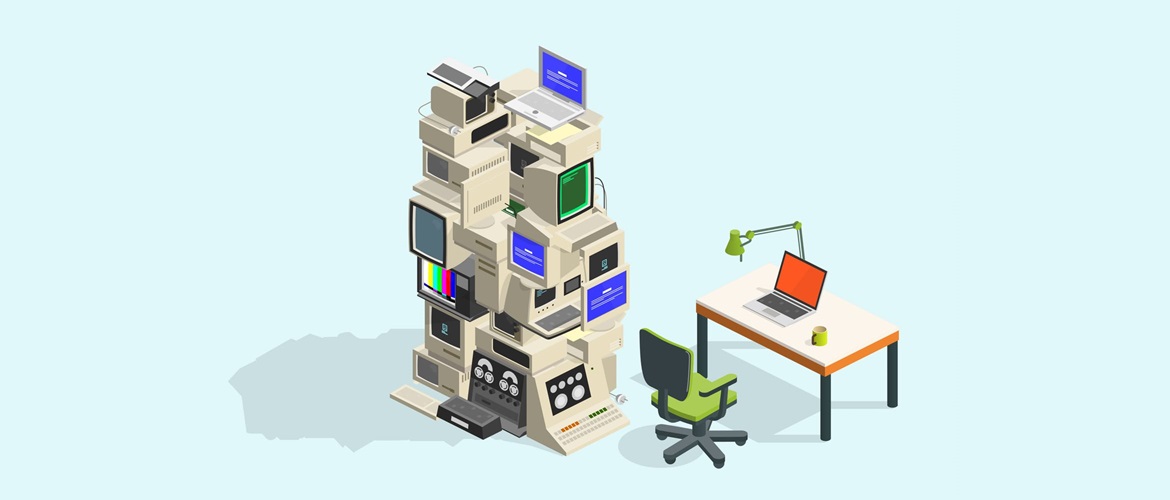
What is e-waste and how can businesses do more to help?
It’s something almost all of us are guilty of creating, but what is e-waste? Old phones tucked away in drawers and defunct monitors left gathering dust in the office storeroom.
If it comes with cords, microchips or cables, it’s likely to fall into the growing category known as e-waste. Currently, the UK is one of the leading countries contributing to the rise in electronic waste around the world1.
These electronics contain valuable non-renewable materials such as gold, silver, copper, platinum, aluminium and cobalt. Meaning, when these items are disposed of without recycling, we throw away precious materials integral to electronics manufacture.
By failing to extract and recycle the usable materials in end-of-life electronics, not only are we sending more electrical waste to landfill than we should, but we’re also increasing the risk of long-term shortages in vital materials.
The state of e-waste disposal across the UK and Europe
As some of the world-leaders in pioneering recycling initiatives2, you may think the UK and EU are likely to already be developing methods to tackle the problem.
While this is true to an extent, the unfortunate reality is that meticulous recycling processes required by regulations across western Europe, mean that a large portion of waste is shipped to other countries worldwide, whose regulatory requirements are less demanding.
This process reduces the likelihood that effective recycling methods are used, recovers less materials and potentially puts workers at greater risk in the countries that take the waste. However, progress is being made as the European Parliament is increasingly pushing for change – firstly in the way products are manufactured, in order to make recycling easier when they become obsolete, and secondly in how consumers can ensure their products are recycled in the most optimal ways.
How manufacturers can do more to help to tackle electronic waste
There are a number of approaches responsible manufacturers are taking in order to help reduce electronic waste. These include building products that last longer and are easier to repair – such as modular products whose parts are easy to remove and replace - as well as providing customers with schemes to support them in disposing of old equipment properly and introducing refurbished components into the production process.
For those responsible for choosing IT equipment, and who also want to improve their performance on e-waste, looking at manufacturer’s green credentials is a good place to start.
This is an important consideration for business’ IT departments. They often buy electronics in bulk and are therefore best placed to take action to ensure that the products they use are sourced from responsible vendors, and more importantly, implement better practices to ensure office tech is used and recycled responsibly.
What are some of the key things your business can be doing now?
Opportunities for organisations to reduce e-waste will largely be found in a few key areas. This can be achieved by auditing the technology used in your organisation for:
- expected lifecycle
- recyclability
- repairability
- manufacturer support
For most businesses, sustainability and recycling initiatives are already an important part of the way they operate. That’s why one of the easiest ways to get involved is to seek partnerships with providers that already have environmentally conscious approaches to electronic waste in place.
Brother’s managed print service and 3rd party solutions like Kofax give organisations the opportunity to get the most out of their technology and tackle evolving future workplace challenges, meaning that devices are fit for purpose for longer.
Scalable, built-to-last tech extends lifecycle and reduces e-waste
And when it eventually comes to the time where a device's lifecycle is surpassed and it can no longer be fixed, we’ll dispose of it for you in accordance with the Waste from Electrical and Electronic Equipment policy (WEEE), ensuring it is processed in the most sustainable way.
As a zero waste to landfill business, Brother is ideally placed to help you tackle e-waste. Our products are independently accredited for their environmental impact, helping leaders ensure their business is supporting the planet.
Electronic waste recycling: Thinking cradle to cradle
One of the biggest issues facing consumers/businesses in the past has been the inclusion of planned obsolescence, where a device will only function well for a number of years before gradually failing, prompting repeat product purchasing – hopefully with the same company – a short way down the line.
Businesses should be aware of this tactic, which is well known to have been employed by some of the most world-renowned brands. Where possible they should focus on sourcing their tech from responsible vendors and manufacturers who offer products designed to maximise lifespan, minimise waste and support a circular economy, where whole products or components are re-used instead of heading to the scrapyard.
Thankfully, a growing number of manufacturers seem to be waking up to the damage done by built-in obsolescence, and regulators are also working to make positive change. For example, both the EU and UK introduced regulations in July 2021 requiring manufacturers to make spare parts available to professional repairers.
Seek accredited suppliers
Finding the right equipment manufacturer for your business can sometimes be a delicate balance, making sure to do your due diligence alongside wider procurement across your business.
Helpfully, there are several environmental certifications that can add further rigour to your audit process and support procurement decisions. As certifications are independently awarded to companies, they also represent a non-biased look into the way a business conducts itself, giving you additional peace of mind that you’re working with someone you can trust.
At Brother, we have always had a strong commitment to the environment, and we remain committed to maintaining excellent environmental performance, which is why we recently transitioned to the latest version of the ISO 14001:2015 environmental management quality standard.
We have accomplished major milestones, such as Zero Waste to Landfill and have been awarded The Queen's Award for Enterprise: Sustainable Development in both 2011 and 2018. Whilst we continue to meet these requirements and strive for the best in our sustainable practices, we also focus our efforts on raising awareness and helping our customers to become more sustainable.
Expectations around green credentials have changed with customers, investors and regulators all demanding more from businesses across the board. When it comes to e-waste, which manufacturer you choose can make a big difference.
Find out more about Brother’s efforts towards more sustainable business practices and how you can partner with us for a greener tomorrow, here.
References
2. https://wrap.org.uk/taking-action/plastic-packaging/initiatives/the-uk-plastics-pact
3. https://ec.europa.eu/environment/pdf/circular-economy/new_circular_economy_action_plan.pdf



